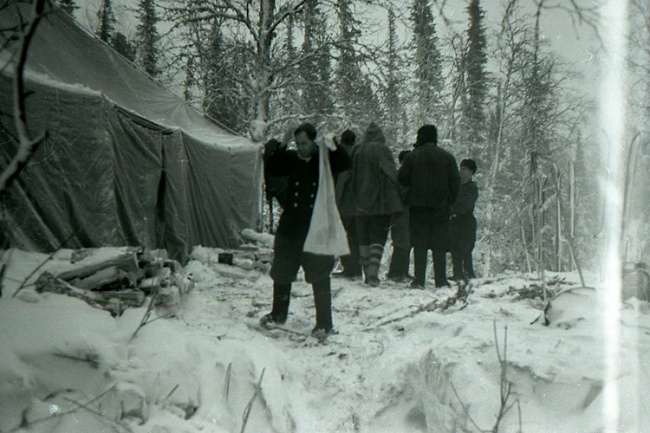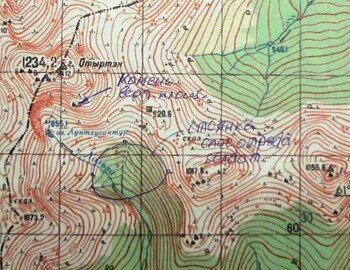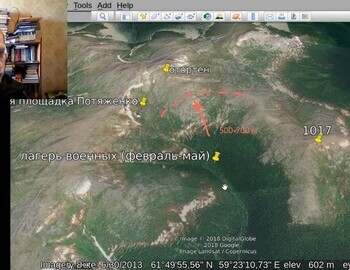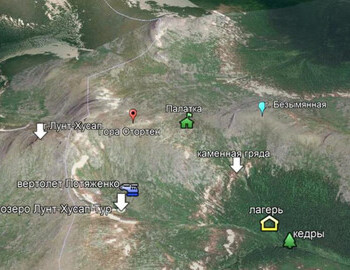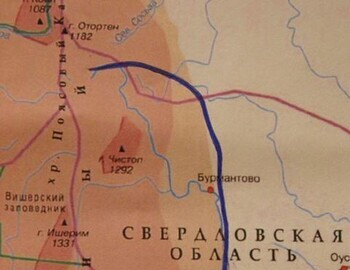
"The prisoners told us - the hikers were killed, but you are looking in the wrong place"
Our journalists talked to another searcher for the missing group of skiers - serviceman Hamza Syunikaev
October 11, 2021. All rights reserved Komsomolskaya Pravda. Authors Nikolay Varsegov and Natalya Varsegova
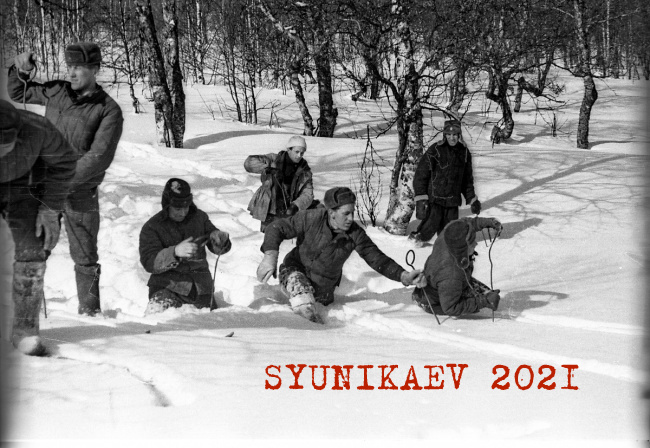
During the search for the Dyatlov group. Syunikaev is in the first row in the center
In the winter of 1959, nine hikers under the leadership of Igor Dyatlov disappeared in the mountains of the Northern Urals. A month later, rescuers found their tent cut open. And within a distance of one mile down the slope five frozen bodies. The bodies of the rest were found only in May. Almost all the hikers were barely clad. Some had fatal injuries. It is still not clear why the students fled to the bitter frost and to their own death.
Hundreds of people, both civilians and military, took part in the search for the hikers. Their peers, students of the Ural Polytechnic Institute, flew to the then unnamed pass. For several weeks, servicemen from the 5th railway company, headed by Lieutenant Colonel Shestopalov, worked there. And there was another group of military men from military unit 6602 under the command of Captain Chernyshev. It consisted of conscripts of the armed camp guard. Among them is Sergeant Hamza Sinyukayev. He is now 85 years old. Hamza Fazylovich lives in the Kurgan region, on the border with Kazakhstan. The search for Dyatlov's group was remembered by him as the most unusual incident in his army service.
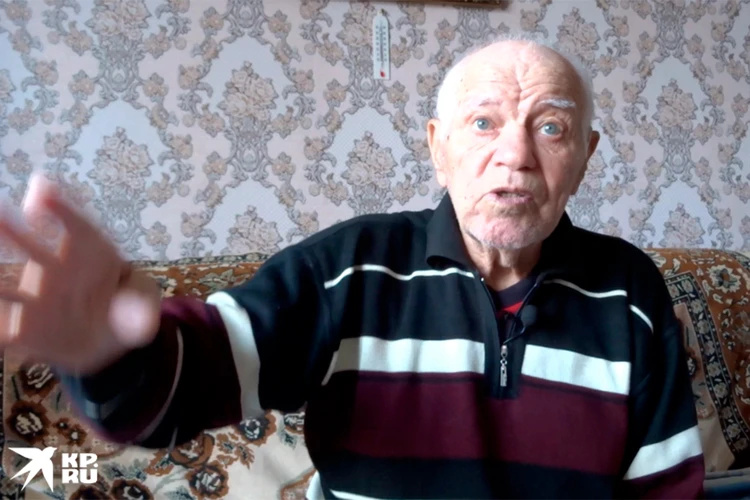
Hamza Syunikayev remembers well the events of 60 years ago.
Photo Natalya Varsegova
- I was drafted in 1957, recalls Hamza Fazylovich, in 1960 I was demobilized. I was an athletic guy, tough. But I still remember how hard it was for me on the pass.
- Remember how it all started? We asked.
- In March 1959, the alarm was raised at night.
- Where were you then?
- In a strict regime colony in Ivdel-2. In the morning, I remember, we were at the airport. A helicopter was waiting for us. And seeing off...
- Who?
- Parents of the hikers. They asked, begged - find our children. They were crying. Up to this moment we had heard that only two of them were found. A guy and a girl. They were found together, as if he was dragging her on top of him.
- 2 -
- How many were you?
- Eight or nine.
- What was the order?
- Look for anything: people, backpacks, letters, notes, cameras. They said that every hiker had a camera. When we disembarked from the helicopter, the first thing they did is take us to the place where the Dyatlov group tent was found. But there everything was already dismantled and trampled down.
- What conditions did you live in at the pass?
- In a soldier's big tent for 25 people. Besides us, there were civilian searchers, a radio operator and our guards.
- You were guarded?
- Of course! Constantly - day and night.
- And why and who guarded?
- The company commander Chernyshev and another captain from Sverdlovsk watched us so that we don't run away or inadvertently steal belongings of the hikers if we find any. You never know.
- How did you search for the hikers?
- Early in the morning we got up, had a dry breakfast, took the probes and went in search. They determined the place of the search for us, lined up in a line 10-15 people, and we walked constantly poking the snow. If suddenly something bumped under the snow, they called the commander, he checked, and then ordered to dig it. But we didn’t find anyone or anything. Only stones.
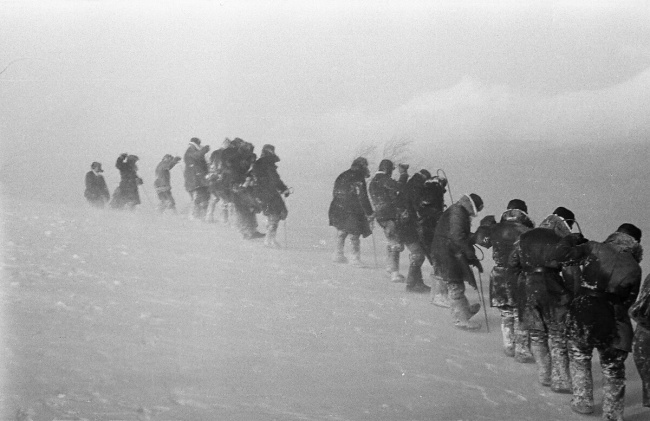
The search went on in difficult weather conditions.
- How long have you been at the pass?
- A month. At first we honestly searched, and then we began to simulate. We quickly realized that people had already walked along the same squares before us. Moreover, we came across traces of boots there. We didn't know where did they come from. They [the hikers] were all in felt boots. Therefore, the guys and I concluded that someone in boots walked here before us and they were not just anyone. They could even be the KGB. But that was just our speculation. It was necessary to somehow explain the presence of these footprints.
- And why weren't these footprints covered up, if they were left before you?
- And the traces were not covered at all. They were blown out and they remained on the snow crust for a long time.
- 3 -
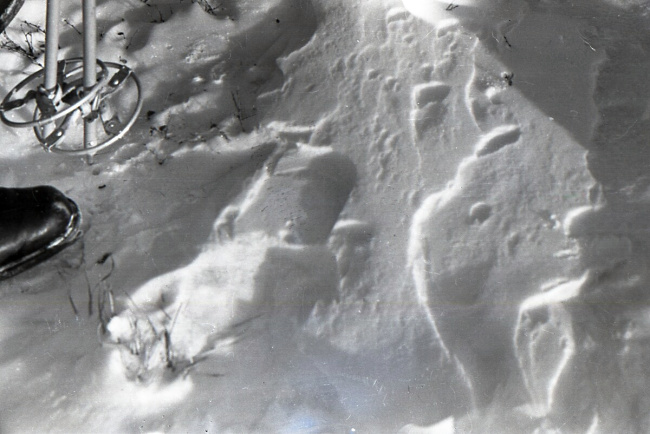
A footprint from the boot left before the search group arrived.
- Do you remember by the names of your co-workers?
- Only two - Victor Klimenko, he is now dead, and Yuri Zauzin. We also had a company from a special department with us.
- How did you know this?
- They were all in sheepskin coats and armed. They did not communicate with us.
- Maybe they were sappers from the railway company?
- No, the sappers were on the pass before us. We arrived to the pass after they had left.
- And this company from the special department, what did they do?
- They searched with us with probes.
- What were you wearing?
- Pea coats, hats, felt boots.
- What were you told happened to the hikers?
- We were told that the group went on a hike and died. But they were killed!
- Did you decide that yourself?
- No. The prisoners told us.
- How did they know?
- The prisoners knew all the news - and what was happening in the Far East, and in Irkutsk. And here, right under their nose, a tragedy happened. We, the convoy, lived with the convicts. And, of course, we discussed this case. So the convicts said - this is murder, but you are looking in the wrong place.
- So if the prisoners told you about the death of the hikers, then it turns out that one of the prisoners killed them?
- Although most of them were imprisoned for murder, but no, it was not the convicts who killed the hikers. By that time, I had served for the third year already and knew the convicts' habits well. They would not rush after the hikers into the mountains. There was nothing special to take from the group. No values to justify the risk. And if the convicts ran away, they tried to leave by railway. A fugitive cannot sit in the forest for a long time in winter. The dogs will find them while crawling in snowdrifts up to the waist.
- Did the investigators interview the prisoners?
- Do think so.
- How about you?
- No.
- What was the hardest thing during the search?
- Weather. Strong wind and frost.
- What was the most unusual thing?
- Bright balls in the sky. They rose from the south and went beyond Mt Otorten. Sometimes we heard the sounds of explosions from there. Most often this happened at night. Someone will go to the toilet, see the ball and call the rest.
- What kind of balls do you think they were? You and the guys probably discussed this.
- We discussed it, but could not understand. And the officers did not talk about that.
- Were the Mansi participating in the search with you?
- No. They came to us once a week when the helicopter was bringing food. They traded with the pilots meat and horns for alcohol. They would trade and immediately get drunk. I remember how one Mansi got very drunk, but he wanted more. And the helicopter pilot refused [to give him more alcohol]. Then he pulled out a gorgeous sable skin from his bosom. I was jealous - I wish I had one! The pilot took the sable and poured more alcohol. They always had alcohol with them. We were stealing it from them.
- What happened after the search?
- We were brought back to the unit, sent to the bathhouse, and changed. And they ordered to forget everything that we heard in the mountains, not to tell anyone anything.
- But you didn't know what happened there. Why was it necessary to keep silent?
- I don't know.
From the authors
The opinion of the prisoners who know everything, in our opinion, is rather dubious. However, in the memoirs of Hamza Syunikaev there are interesting moments that show the reality of the searches that took place. At the very beginning, the missing hikers rushed to search zealously - and what was on the surface - the tent, the first bodies - were quickly found. After that, the enthusiasm clearly died down. It became obvious that the remaining four hikers also died somewhere nearby. Because what is the point of trying if the snow will soon melt and the bodies will reveal themselves on its own.
Syunikaev refutes the version of an attempt on the life of the hikers by fugitive convicts, proving once again that no prisoner will rush into the mountains in winter, where one can die from the cold.
And here again these mysterious balls. Yes, we already wrote that these balls are most likely traces of missile launches. The launch dates of rockets from Kapustin Yar and the dates when the searchers saw the fireballs in the sky over Otorten coincide. But this time "sounds of explosions were heard" behind Mt Otorten, where the balls were leaving. If such information about the explosions of, presumably, fireballs behind Otorten is confirmed from any other sources, it will be a serious reason for further investigation of this mystery.
We thank Hamza Fazylovich for this conversation.
And if you have reliable information about the death of the hiking group on the Dyatlov Pass, write to us: vars@kp.ru, konata@kp.ru.
You can see Potyazhenko's landing site and Syunikaev's unit 6602 camp on these maps. But take a closer look. Potyazhenko drew his landing site on a rock on the steep slope of Otorten. Semiletov and Bobrikov based their maps on the one Potyazhenko drew and gave Kuntsevich, but they moved Potyazhenko's landing site on the Lunthusaptur lake, the first place where a helicopter could have landed south of Otorten. The route on the last (simplified, no contour lines) map is drawn by Potyazhenko himself in 2014 during an interview by Irina. The route is clearly not ending on Otorten but the Dyatlov Pass. In that same interview Irina says that she had given up showing Potyazhenko other maps he can't see well. His sight has not gotten any better in four years when he circled in 2018 where he landed in 1959. Also he had taken picture of the rock where he landed and that is the rock with the monument plaque on the Dyatlov Pass. In another interview by Olga Potyazhenko clearly says that he "landed near a rock on the saddle between Auspiya and Lozva". When Potyazenko was shown a modern photo of Kholat Syakhl and the outlier rock: "here I was sitting (landed near the rock), there is a descent (points south to the Auspiya valley), in this place there was the soldier's camp..." Where did he see the tent of the Dyatlov group, he points to the Kholat Syakhl slope, "700 meters from the rock".

